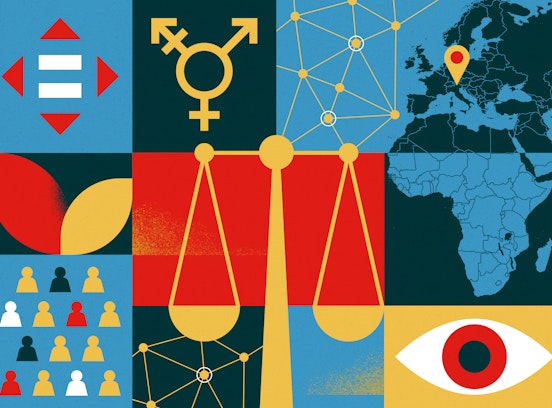Center for Advanced Studies - News & Events - Understanding Globalization: Who Has Access to Global Knowledge?
Understanding Globalization: Who Has Access to Global Knowledge?
The 4th edition of the "Understanding Globalization" series delves into the production and dissemination of knowledge in a globalized world
Who produces global knowledge? Who has access to it? Where is access to knowledge obstructed? And what exactly do we mean when we talk about a globalized world? To explore these questions, the Center for Advanced Studies at Eurac Research once again brought together numerous experts as part of the "Understanding Globalization" conference.
 Credit: Eurac Research | Valeria von Miller
Credit: Eurac Research | Valeria von MillerIn everyday life, we often turn to the internet or consult experts when we need information. Our society is aptly called a knowledge society or information society. While some of us benefit from easy access to global educational and knowledge sources, others face digital, cultural, or political barriers that limit their access to comprehensive information. Kathleen Schlütter, an expert on inequalities and global knowledge production, focuses on access to scientific knowledge and examines biases in artificial intelligence. Of the approximately 7,000 languages worldwide, only 7 percent are represented in published online material. In fact, 98 percent of websites are written in just 12 languages, with more than half in English. This means only a small part of global knowledge is available online. In many parts of the world, the global exchange of knowledge is not only neglected but actively hindered, distorted, or even completely blocked.
You can listen to the interview with Kathleen Schlütter on the radio program of the public broadcaster RAI Südtirol HERE.
Oxford Professor Jennifer Altehenger emphasized in her short lecture on "Global Circuits of Knowledge Production in Modern China" that an Anglo-American and Eurocentric perspective still dominates global knowledge production. She focused on questions such as: How do we acquire knowledge? What do we want to know? And what we don't? Many aspects of globalization are viewed from a purely economic perspective, such as the New Silk Road, often overlooking the exchange of knowledge. A nuanced examination of these specific aspects of globalization is crucial, as Harald Pechlaner, Head of the Center for Advanced Studies, and Co-Head Roland Benedikter, emphasized in their opening lecture.
No signs of an end to globalization
Globalization researcher Manfred B. Steger, a returning guest at Eurac Research, analyzed globalization from a differentiated perspective, emphasizing the need of a theoretical framework first. Differentiation must be integral to globalization. Specifically, the concept of "social symbiosis" can be applied to globalization theory: "symbiosis" refers to the connection and interaction between different globalization formations, where no formation can exist without the others. He also highlighted that there are no signs of deglobalization — an end to globalization — nor indications of stronger regionalization.
Political philosopher Sebastiano Maffettone also presented a theoretical approach to globalization. He discussed political realism, liberal democracies, pacifism, and the possibility of a just war, particularly when it defends liberal democracies. Economist Henning Vöpel concluded his lecture on the waves, paradigms, and narratives of globalization with an outlook on the future of liberal democracies. They face a massive crisis of trust, where many citizens no longer believe that democracy can address the numerous crises in favor of the population. To renew this trust, new narratives are needed.
Promoting new generations in Globalization studies
Political economist James Mittelman presented possible scenarios for the future of globalization: the liberal, the catastrophic, and the hopeful scenarios. The future of globalization will be primarily a battle of ideas and a struggle of material and social forces, he emphasized. How can the decolonization of globalization succeed? The conference provided a pragmatic answer: it can only begin if white men step back and focus their energy on promoting new generations that do not share their profile.
The conference also featured the book presentation of "Globalization – Past, Present, Future" published by the University of California Press. Zoe Krueger Weisel, a political scientist at the Center for Advanced Studies, moderated a discussion with editors Manfred B. Steger and Ingrid Kofler, along with Tommaso Durante, researcher in Globalization and Mediatization. Finally, the journal "New Global Studies" (NGS, De Gruyter), published in collaboration with researchers at the Center for Advanced Studies at Eurac Research, was introduced. Christoph Kircher, a sociologist at Eurac Research and Managing Editor, provided insights into the journal's origin, thematic focus, and publication criteria.










